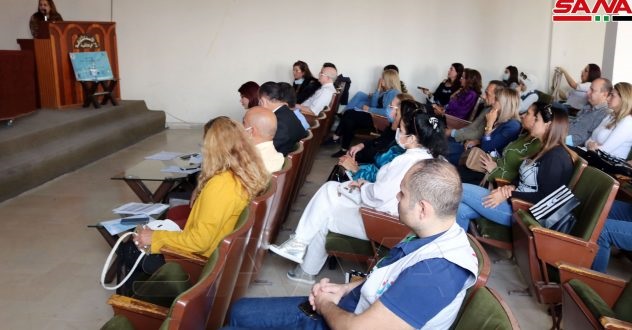Millions of people are dependent on the marine environment and the resources they provide for their survival and well-being. However , over the years, population growth and economic development have resulted in an increasing number of anthropogenic activities on land and an increase in pollution globally which has contributed to degrading the environment and related ecosystem services.
Under the title “Together for Protecting our Marine Environment”, the activities of the Mediterranean Day, organized by the Syrian Coast Association for Environment Protection in cooperation with a number of activities concerned with environment protection and preservation, were recently held at the Cultural Center in Lattakia.
A number of lectures were given during the scientific event which focused on the reality and ways of preserving the environment.
Dr. Suhair Al -Rayes, Head of the organizing Association’s Board of Directors, referred to the new concepts presented to the countries of the Mediterranean basin by international organizations concerned with ocean and sea affairs.
She stressed that the new concepts aim to change the daily behavior of individuals with regard to waste materials on the seashore and their visual and aesthetic impact on the health of the population and future generations.
 In turn, Dr. Amir Ibrahim, Dean of the Higher Institute for Marine Research, referred to the Syrian coastal areas devastated by marine erosion due to the erosion of gravel and sand, and areas threatened by inundation as a result of rising sea levels, which constitute 45.7 km of the Syrian coast.
In turn, Dr. Amir Ibrahim, Dean of the Higher Institute for Marine Research, referred to the Syrian coastal areas devastated by marine erosion due to the erosion of gravel and sand, and areas threatened by inundation as a result of rising sea levels, which constitute 45.7 km of the Syrian coast.
He added that marine animals are threatened on the Syrian coast, such as turtles, birds, seals and whales, indicating that there are proposals to establish a network of marine reserves on the Syrian coast as well as focusing on the need to adhere to international standards for the disposal of sewage waste.
Head of the Fisheries Department at the Higher Institute for Marine Research, Dr. Sherine Hussein, and Deputy Dean of the Higher Institute for Marine Research indicated that the factors affecting fish stocks are natural and human ones.
Concerning the natural ones, Dr. Hussein said that they are related to water salinity, its high temperature and its relationship with other species as a food chain, adding the effect of human factors come through overfishing and contributing to environmental pollution, which requires the application of recommendations related to determining appropriate seasons for fishing and preventing the use of illegal fishing methods.
Dr. Bashar Badour, a researcher of the Environment Directorate in Lattakia, pointed to the role of home gardens in sustainable development in terms of mitigating climate change through the biological storage of carbon, providing environmental diversity, reducing insect pests, and securing food throughout the year.
Concluding the activities of the Mediterranean Day, the Syrian Coast Association for the Protection of the Environment organized a cleanliness campaign on the southern Corniche beach in cooperation with Lattakia Governorate, the Tourism and Environment Directorates, and a number of associations and bodies concerned with preserving the environment and people.
The campaign aims to send a message to the local community and the public that waste should not be littered on beaches and in the sea.
The volunteers in the campaign stressed the importance of dedicating a culture of waste recycling and benefiting from it for multiple purposes, noting that their participation expressed the importance of consolidating the concept of preserving the environment to become a general social condition and daily behavior for all citizens.
Rawaa Ghanam

